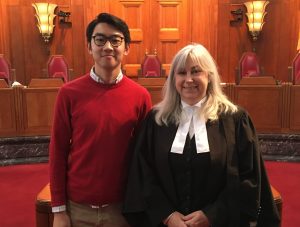
By Jeffrey Wang
As a clinic student this term, I had the opportunity to hear the Asper Centre’s oral arguments in its intervention at the Supreme Court of Canada in the appeal of Ontario v. G, which took place on February 20, 2020. The appeal concerned the constitutionality of the Ontario and federal sex offender registry laws, which required offenders found not criminally responsible (NCR) to report to the registry for life, even if they had been absolutely discharged by the Ontario Review Board (ORB). Offenders not found NCR who receive an absolute discharge, record suspension, or pardon do not have to report to the registries. In this way, the claimant, G, who was found to be NCR after his criminal trial, argued that the Ontario and federal sex offender registry laws violated his s. 7 and s. 15 rights under the Charter.
Justice Doherty for the Ontario Court of Appeal did not find a s. 7 violation. However, he recognized that the sex offender registries drew a discriminatory distinction based on the ground of mental disability under s. 15 of the Charter, since the law reinforces the stereotype that NCR offenders are indeterminately dangerous. Under s. 1, the court focused on the fact that the reporting requirements for NCR offenders did not have any “exit ramps” even though similar “exit ramps” are available for non-NCR offenders. Justice Doherty found that this was not a minimal impairment of s. 15 rights and struck down the laws.
Supported by the faculty of law’s Professor Kent Roach, the Asper Center intervened in this appeal on the issue of remedies, specifically about when delayed declarations of invalidity intersect with the need for constitutional exemptions in Charter litigation. In this case, the Ontario Court of Appeal suspended the declaration of invalidity for one year in order to allow the legislature to amend the impugned laws. However, Justice Doherty exempted the applicant G from this suspension, which meant that G was removed from the sex offender registry reporting requirements, effective immediately. This was controversial, since the Supreme Court in R v Demers had expressly advised against exempting individual claimants from suspended declarations. The Asper Center argued that the Demers rule must be overturned. This is due to the fact that the Supreme Court has exempted individual claimants from suspended declarations in the past, such as in Corbiere and Carter. In addition, without the ability to exempt claimants from suspended declarations, individual claimants must wait until the completion of the suspended declaration in order to receive any benefits of their successful claim. The Asper Center also argued that the Supreme Court should only use suspended declarations of invalidity as a remedy when it is justified as necessary and proportional. This is in line with international practices such as the Hong Kong courts’ use of suspended declarations as well as the Supreme Court’s own jurisprudence on other constitutional remedies. Furthermore, many scholars are critical of the overuse of suspended declarations of invalidity since the remedy creates uncertainty and allows laws to continue violating Charter rights during the suspension.
My experience working on this case provided me with an invaluable look into appellate advocacy. At the Supreme Court, the arguments focused on if the sex offender registry laws violated s. 15 of the Charter and security of the person under s. 7. Many of the Justices were critical of the government’s s. 15 argument, asking numerous questions on the implications of their evidence that NCR offenders are more likely than the average population to commit another offence. Although the Asper Center was only given five minutes, Asper Centre Executive Director Cheryl Milne effectively addressed all of our arguments, and the Justices seemed receptive. It was exciting to see the research I conducted on Hong Kong’s jurisprudence not only be included in our factum, but also mentioned in our oral arguments. Ultimately, we will have to wait to see if the Supreme Court will take our invitation to re-imagine the use of suspended declarations of invalidity as a constitutional remedy.
Jeffrey Wang is a 2L JD student at the Faculty of Law and is the current Half-time Asper Centre Clinic student.
